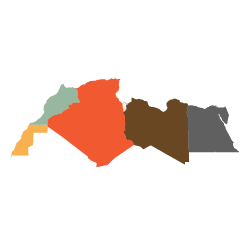Monitoring & Evaluation of Community Challenges to Violent Extremism – Civil Society Capacity Building Initiative in Tunisia
Background:
AMIDEAST, in collaboration with local Tunisian organizations Shanti and Jamaity, is executing the BLADI initiative, a two-year project supported by the US Department of State, Bureau of Counterterrorism. BLADI, short for “Building Local Associations for Development and Innovation,” centers on bolstering the capacities of Tunisian Civil Society Organizations (CSOs) engaged with individuals and communities affected by violent extremism. By cultivating the capabilities of these local CSOs, BLADI aims to mitigate the influence of violent extremism and support vulnerable populations. This initiative comes as a response to the pressing need to address the challenges of CVE at the grassroots level and empower Tunisian communities.
Triangle’s Assessment:
- Comprehensive Project Evaluation: Triangle took on the responsibility of conducting a thorough evaluation of the BLADI initiative. This assessment covered a spectrum of critical dimensions, including relevance, efficiency, effectiveness, impact, and sustainability. The aim was to gauge the project’s overall performance and outcomes, with a particular focus on its alignment with the CVE objectives.
- Role Evaluation of Partner Organizations: Triangle’s assessment extended to an evaluation of the roles and responsibilities of key project stakeholders, namely, Jamaity, Shanti, and AMIDEAST. This evaluation sought to appraise the efforts made by these organizations in building the capacity of local CSOs and administering sub-grants. It aimed to understand how each partner contributed to the success of the initiative.
- Capacity Building Support: Triangle provided support to Shanti in executing evaluation activities. Furthermore, it took on the role of training development teams and piloting CSOs in Monitoring and Evaluation (M&E) practices. These capacity-building activities incorporated the innovative Participatory Organizational Needs Assessment (PONAT) methodology.
- M&E Analysis: Triangle conducted a top-level analysis of the M&E activities implemented throughout the project’s lifecycle. This involved scrutinizing the effectiveness and efficiency of the monitoring and evaluation processes, highlighting areas of strength and potential improvement.
- Summative Evaluation Report: Drawing from baseline and endline findings, Triangle compiled a comprehensive summative evaluation report. This report not only encapsulated the project’s journey but also presented actionable recommendations for future programming initiatives. It served as a valuable resource for guiding subsequent CVE efforts and informed strategic decisions for sustainable community development in Tunisia.
Project:
Monitoring & Evaluation of Community Challenges to Violent Extremism- Civil Society Capacity Building Initiative in Tunisia

Location: Tunisia

Service type:
Qualitative Research, Quantitative Research,
Capacity Building and Training